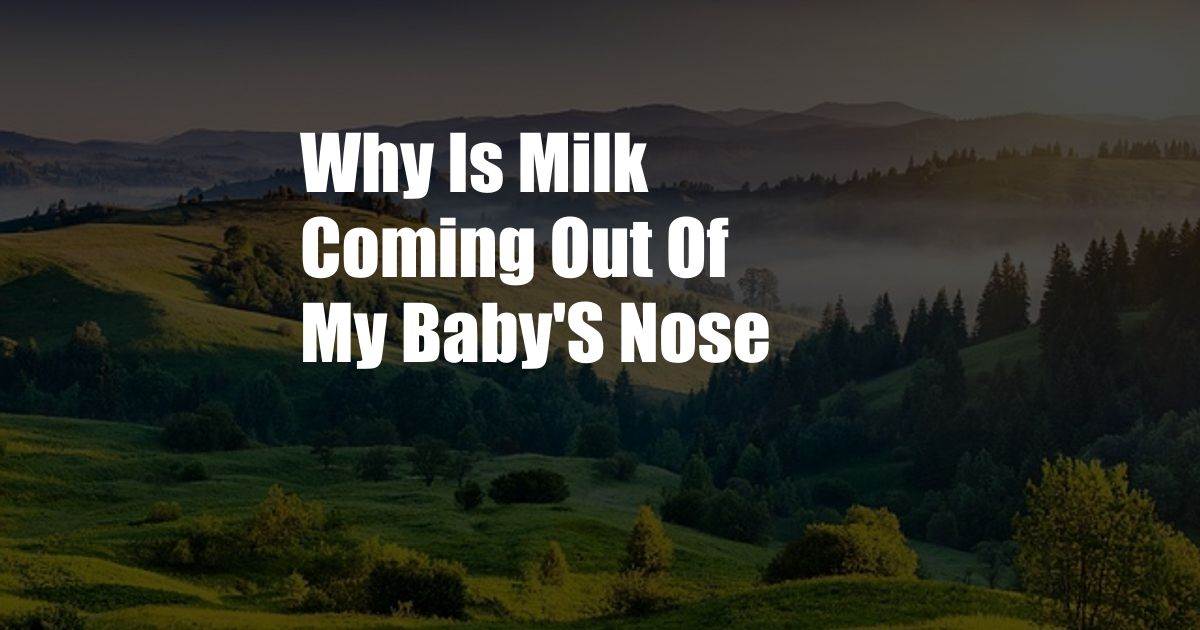
Why Is Milk Coming Out of My Baby’s Nose?
As a new parent, it can be alarming to see milk coming out of your baby’s nose. While it’s not uncommon for babies to spit up or regurgitate small amounts of milk, it’s important to understand what could be causing this and when to seek professional help.
In most cases, milk coming out of the baby’s nose is a result of immature motor skills and reflexes. When babies swallow, their soft palate, the roof of their mouth, should close off their nasal passages to prevent milk from entering the nose. However, sometimes this closure is not complete, allowing milk to escape through the nose.
Gastroesophageal Reflux (GER)
Gastroesophageal reflux (GER) occurs when the stomach contents flow back into the esophagus, which can cause milk to come out of the baby’s nose. GER is common in babies who have a weak or immature lower esophageal sphincter (LES), the muscle at the bottom of the esophagus that keeps stomach contents down.
Symptoms of GER include:
- Frequent spitting up or vomiting
- Milk coming out of the baby’s nose
- Fussy or crying after feedings
- Coughing or choking
- Weight loss or failure to thrive
Causes of GER in Babies
There are several factors that can contribute to GER in babies, including:
- Immature digestive system
- Weak or immature LES
- Overfeeding
- Feeding the baby too quickly
- Positioning the baby incorrectly while feeding
- Certain medical conditions, such as pyloric stenosis or a hiatal hernia
Tips for Managing GER in Babies
There are several things parents can do to help manage GER in their babies, including:
- Feeding the baby smaller, more frequent meals
- Burping the baby frequently during and after feedings
- Positioning the baby upright after feedings
- Elevating the head of the baby’s crib or bassinet
- Thickening the baby’s formula or breast milk with rice cereal
Expert Advice
If your baby is experiencing frequent milk coming out of the nose, it’s important to consult with a healthcare professional. They can assess your baby’s symptoms and recommend appropriate treatment options.
In some cases, medication may be prescribed to reduce stomach acid production or strengthen the LES. In severe cases, surgery may be necessary to correct an underlying medical condition causing the GER.
Frequently Asked Questions
Q: Is it normal for milk to come out of my baby’s nose?
A: It is not uncommon for babies to spit up or regurgitate small amounts of milk, including through the nose. However, if it happens frequently, it may be a sign of an underlying medical condition.
Q: What are the signs and symptoms of GER in babies?
A: Symptoms of GER in babies include frequent spitting up or vomiting, milk coming out of the nose, fussiness or crying after feedings, coughing or choking, weight loss or failure to thrive.
Q: How can I manage GER in my baby?
A: There are several things parents can do to manage GER in their babies, including feeding the baby smaller, more frequent meals, burping the baby frequently during and after feedings, positioning the baby upright after feedings, elevating the head of the baby’s crib or bassinet, and thickening the baby’s formula or breast milk with rice cereal.
Q: When should I seek professional help for milk coming out of my baby’s nose?
A: If your baby is experiencing frequent milk coming out of the nose, it’s important to consult with a healthcare professional. They can assess your baby’s symptoms and recommend appropriate treatment options.
Conclusion
Milk coming out of a baby’s nose is usually caused by immature motor skills and reflexes. However, it can also be a sign of an underlying medical condition, such as gastroesophageal reflux. If your baby is experiencing frequent milk coming out of the nose, it’s important to consult with a healthcare professional.
Are you interested in learning more about infant feeding and nutrition?